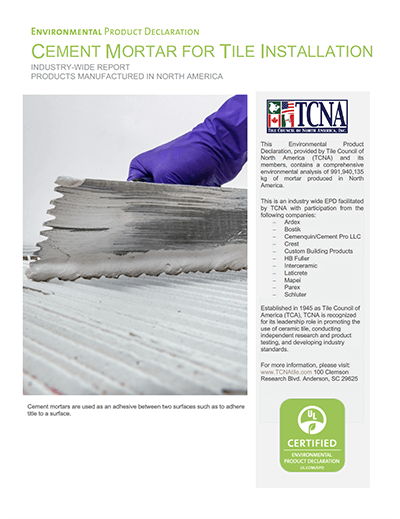Cement mortar is the adhesive that secures tile to a surface once it has dried from the installation process. Cement mortar is a blend of cement, finely graded sand, and water retention compounds that enables the cement to properly hydrate. It often contains different polymers or additives to improve adhesion, add strength, and/or accommodate movement.
The Tile Council of North America (TCNA) is providing an environmental product declaration (EPD) in accordance with ISO 14025 to express information on several different environmental impacts of cement mortar over its life cycle. The document is available for download below.
Information in the EPD is as follows: definition of cement mortar, building physics of the material, basic material information and origination, a description of the manufacturing process, indication of how mortar is processed, details about mortar’s in-use conditions, results of the life cycle assessment of cement mortar, and testing results and verifications.
All of the cement mortar materials reviewed in the EPD either meet or exceed these technical specifications:
- ANSI A118.1 – American National Standard Specifications for Dry-Set Cement Mortar
- ANSI A118.4/11 – American National Standard Specifications for Modified Dry-Set Cement Mortar
- ANSI A118.15 – American National Standard Specifications for Improved Modified Dry-Set Cement Mortar
- ISO 13007 – Terms, Definitions and Specifications for Ceramic Tile Grouts and Adhesives
In addition, some cement mortar considered in this EPD have been certified to meet ANSI A138.1, the Green Squared® American National Standard Specifications for Sustainable Ceramic Tiles, Glass Tiles, and Tile Installation Materials.
The following TCNA EPD contains a comprehensive environmental analysis of roughly 2 billion kg or mortar produced in North America. Download it below.

